Gutter Downspout Sizes Vary – Bigger is Better
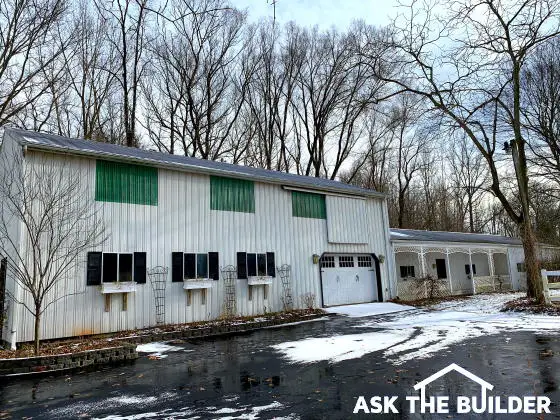
Gutter downspout sizes vary. This is a barn that has gutters. The owner is thinking of removing them. Is this a good idea? Copyright 2020 Tim Carter
"It’s important for you to consider the amount of water that comes off a roof."
QUESTION: Tim, I think I’ve got a good idea. I’m re-roofing two of my barns with metal roofing. I was thinking of extending the roof past the walls 18-inches so dripping water falls farther away from the barn walls. Right now, I’ve got gutters and I’m tired of them clogging up with leaves and debris. What is the best practice when it comes to gutters or no gutters? What about sizes for both gutters and downspouts? What would you do if you were me? Carol K., Whitehouse, OH
Carol’s conundrum is an excellent example of a tip I’ve shared with my children. I’ve encouraged them to travel far and wide. When you do this, you discover things you feel are normal are not so normal in other places. I remember being in Toronto, Canada, years ago thinking it was strange they didn’t have a separate directional arrow traffic signal light telling you when it was safe to turn left at an intersection. After all, that’s what I’m used to in the United States! Those clever Canadians just had the green light flash to tell you it was safe to turn! They felt there was no need for an extra light.
Does Soil Type Make a Difference?
I grew up in Cincinnati, OH. The soil makeup there is a dense poor-draining clay deposited by a series of four massive continental glaciers that covered the land all the way from the North Pole to the Midwest four times in the past two million years. But guess what? The soil makeup in New England, where I now call home, is quite sandy and it drains well. Soil composition is a very important thing to consider when it comes to gutters or no gutters it turns out.
Do All Houses Have Gutters?
Here in New England most houses and barns have no gutters. Not only is the soil conducive to great drainage, but the snow and ice on roofs have a tendency to rip gutters off structures when it slides and tumbles off the roofs! Gutters tend to be bad jujumagumbo in New England for those two reasons.
How Much Water Falls From A Roof?
It’s important for you to consider the amount of water that comes off a roof. Recently, we had two inches of rainfall at my house in just one day. The footprint of my house measures 1625 square feet. Had I harvested all that water in a cistern, I would have collected 2,025 gallons in that short time. Not everyone can harvest water because of laws in different states, but that’s a topic for another time.
What Can Be Used to Minimize Splashing?
Here in New Hampshire where I live, coarse gravel the size of walnuts is placed on the soil beneath the drip line of the roof.
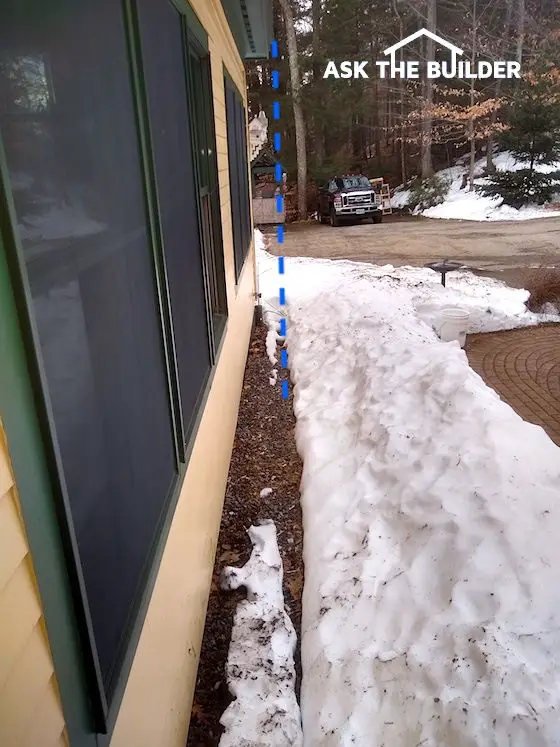
You can see how the water dripping from the roof has melted a distinct line in the snow. It drops down onto crushed stone and doesn't splash onto the house. The dashed blue line simulates the dripping water.
This is an ingenious method of minimizing the splash of the water against the structures. You don’t want lots of water getting the side of your home or barn wet. Gutters and downspouts will collect this water and pipe it to another location to minimize wetting.
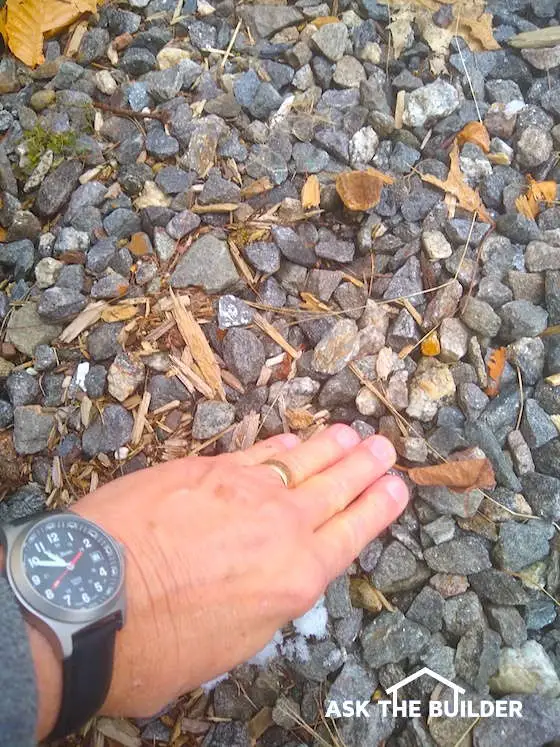
This is the type of gravel that works great to absorb the energy of the dripping water and to prevent splashing. Yes, that's an LL Bean Field Watch. They're fantastic watches and keep very accurate time.
Will Gutters Keep Basements and Crawlspaces Dry?
Gutters and downspouts are a great idea if you have a full basement or want a dry crawlspace. Can you imagine injecting thousands of gallons into the soil next to your foundation and then HOPING it doesn’t seep into a basement or crawlspace? This is why I always advise people that suffer from wet basements to be sure to pipe roof water away from their homes to the lowest spot on their building lot.
What are Common Gutter Sizes?
Typical residential K-style gutters come in two sizes: 5 and 6-inch. By far, the 5-inch size is most popular and works for most roofs. The downspouts help you size the gutters. Typical downspouts come in two sizes: 2x3-inch downspouts fit 5-inch gutters and 3x4-inch downspouts fit 6-inch gutters.
How Much Water Flows Through Downspouts?
The shape of your house or barn and your fussiness about where you want downspouts to be on your house or barn drives the decision on what to do. A single 2x3 downspout will handle 600 square feet of roof area. Surprisingly, a single 3x4 downspout will handle 1,200 square feet of roof area.
Where Should Roof Water Drain To?
The downspout should drop into buried underground SDR-35 plastic sewer and drainpipe. This pipe will carry the water far away from the house or barn. If you live in a city you might be required to pipe your roof water into a local storm-water sewer system or a storm-water holding pond.
Are Splash Blocks Good?
Avoid using the plastic or concrete splash blocks at the base of a downspout. These do nothing to get the water away from your foundation. They’re foolish imposters and trick you into thinking that the roof water is being handled correctly.
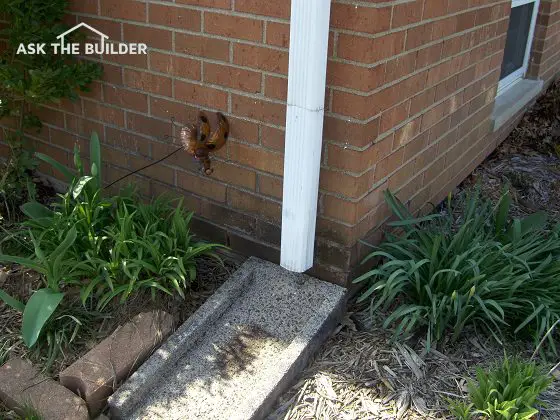
Splash blocks don't do much to channel water away from the foundation. © 2017 Roger Henthorn
What are the Best Gutter Guards?
Great micro-mesh gutter guards can stop debris from getting into gutters. CLICK or TAP HERE to get amazing ones for a fantastic price.
CLICK or TAP HERE to get FREE BIDS from local roofers who can install the gutter guards YOU BUY.
I’ve done gutter guard testing for years and found micro-mesh to be the best system. It’s important for the gutter guards to be installed so their slope matches the slope of the roof above them. This way leaves, twigs, bark, and other debris washes off or is blown off the guards on a windy day.
CLICK or TAP HERE for great videos that show you the BEST GUTTER GUARD TESTING.
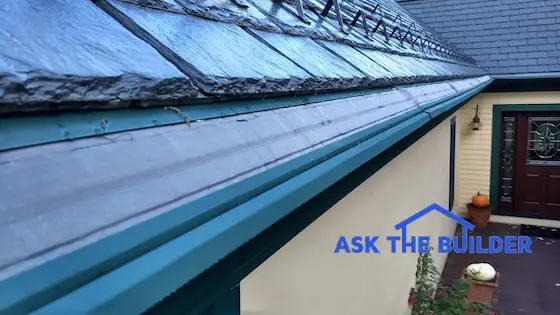
This is a micro-mesh gutter guard. (C) Copyright 2018 Tim Carter
My own home is a great example of how complex your decision might be. I have gutters and downspouts on part of my home so the roof water doesn’t splash up onto my house where I have decks and my front porch. Other parts of my house, the roof water drops to the ground and disappears into the coarse gravel. I’m lucky to have well-drained sandy soil. My basement is bone dry because of the way I’ve engineered my system.
Column 1386
3 Responses to Gutter Downspout Sizes Vary – Bigger is Better